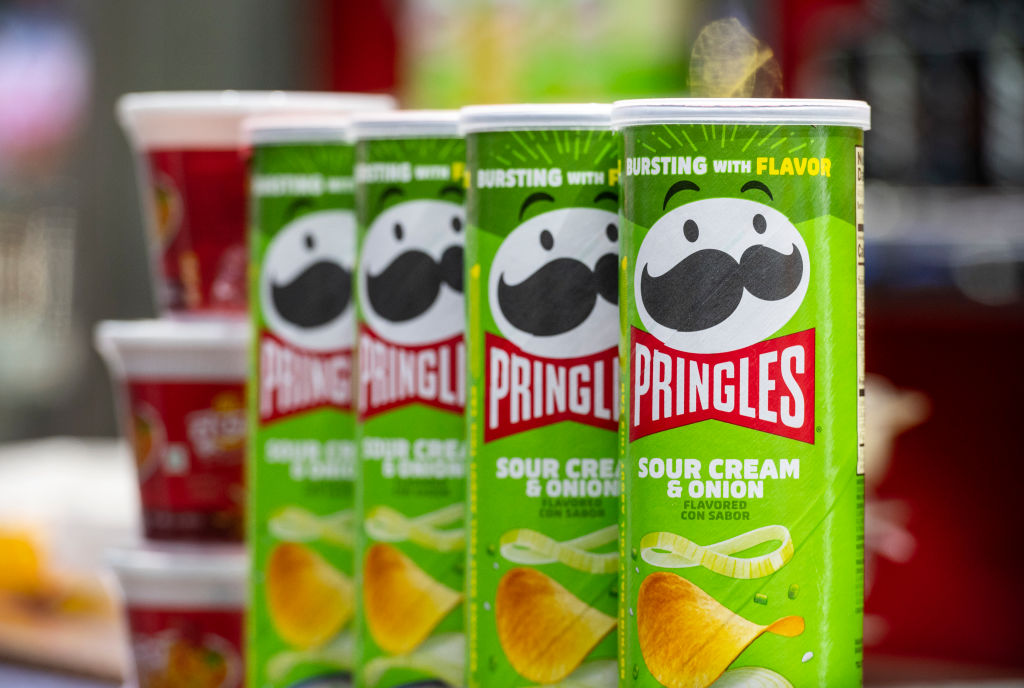Kellanova shares surge by 16%
Shares in Pringles maker, Kellanova, hiked by 16% – should you buy?


Get the latest financial news, insights and expert analysis from our award-winning MoneyWeek team, to help you understand what really matters when it comes to your finances.
You are now subscribed
Your newsletter sign-up was successful
Want to add more newsletters?
Shares in Pringles and Pop Tarts maker, Kellanova, surged by 16% this week after it was reported that confectionery, food and pet care conglomerate Mars is preparing to buy it. That would be “one of the year’s biggest takeovers”, says the Financial Times.
Mars is one of the world’s largest privately held companies, with annual sales of more than $50 billion and more than 150,000 employees. The news also comes as Kellanova has “appeared to weather the slowdown in US consumer spending”, raising its full-year sales forecasts last week after its latest earnings “surpassed expectations”. The shares had gained 15% this year before the bid.
Should you buy Kellanova shares?
Buying Kellanova makes sense, say Crystal Tse and Deena Shanker on Bloomberg. It would give Mars “a greater variety of food labels including Pringles, Cheez-It and Pop Tarts”. It would also help Mars diversify its “chocolate-heavy brand portfolio” away from cocoa, “a commodity whose prices have spiked to historic levels this year and whose outlook remains uncertain”.
Try 6 free issues of MoneyWeek today
Get unparalleled financial insight, analysis and expert opinion you can profit from.

Sign up to Money Morning
Don't miss the latest investment and personal finances news, market analysis, plus money-saving tips with our free twice-daily newsletter
Don't miss the latest investment and personal finances news, market analysis, plus money-saving tips with our free twice-daily newsletter
Kellanova would also help Mars fight back against “declining volumes, slowing growth and a weakening global consumer”. While there are other potential acquirers, including Mondelez International, a purchase by Mars would face less regulatory scrutiny as Mars has less overlap with Kellanova than other brands.
The financial logic of the deal “can just about work, too”, says Jennifer Saba on Breakingviews. There could be nearly $1 billion of synergies. However, the timing “may seem odd”, as Procter & Gamble, McDonald’s and even Amazon have noted that shoppers “are becoming much more discerning on price”.
Meanwhile anti-obesity drugs from Novo Nordisk, Eli Lilly and others “threaten consumption of empty-calorie treats”. Still, “if the market is getting tougher, bulking up to take a bigger piece of it is a textbook defence”.
This article was first published in MoneyWeek's magazine. Enjoy exclusive early access to news, opinion and analysis from our team of financial experts with a MoneyWeek subscription.
Get the latest financial news, insights and expert analysis from our award-winning MoneyWeek team, to help you understand what really matters when it comes to your finances.

-
 The rare books which are selling for thousands
The rare books which are selling for thousandsRare books have been given a boost by the film Wuthering Heights. So how much are they really selling for?
-
 Pensions vs savings accounts: which is better for building wealth?
Pensions vs savings accounts: which is better for building wealth?Savings accounts with inflation-beating interest rates are a safe place to grow your money, but could you get bigger gains by putting your cash into a pension?
-
 The rare books which are selling for thousands
The rare books which are selling for thousandsRare books have been given a boost by the film Wuthering Heights. So how much are they really selling for?
-
 How to invest as the shine wears off consumer brands
How to invest as the shine wears off consumer brandsConsumer brands no longer impress with their labels. Customers just want what works at a bargain price. That’s a problem for the industry giants, says Jamie Ward
-
 A niche way to diversify your exposure to the AI boom
A niche way to diversify your exposure to the AI boomThe AI boom is still dominating markets, but specialist strategies can help diversify your risks
-
 New PM Sanae Takaichi has a mandate and a plan to boost Japan's economy
New PM Sanae Takaichi has a mandate and a plan to boost Japan's economyOpinion Markets applauded new prime minister Sanae Takaichi’s victory – and Japan's economy and stockmarket have further to climb, says Merryn Somerset Webb
-
 Early signs of the AI apocalypse?
Early signs of the AI apocalypse?Uncertainty is rife as investors question what the impact of AI will be.
-
 8 of the best properties for sale with beautiful kitchens
8 of the best properties for sale with beautiful kitchensThe best properties for sale with beautiful kitchens – from a Modernist house moments from the River Thames in Chiswick, to a 19th-century Italian house in Florence
-
 Three key winners from the AI boom and beyond
Three key winners from the AI boom and beyondJames Harries of the Trojan Global Income Fund picks three promising stocks that transcend the hype of the AI boom
-
 RTX Corporation is a strong player in a growth market
RTX Corporation is a strong player in a growth marketRTX Corporation’s order backlog means investors can look forward to years of rising profits